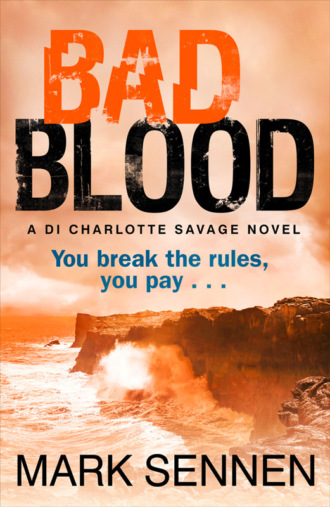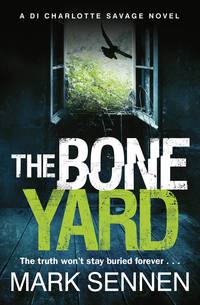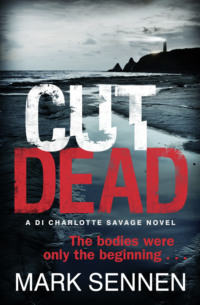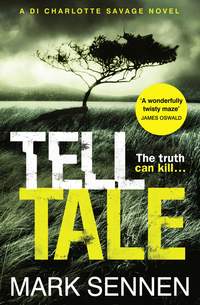
Полная версия
BAD BLOOD: A DI Charlotte Savage Novel
‘Bloody mess.’ Layton scratched his roman nose with the back of his hand and shook his head. ‘Builders don’t wear ballet shoes, do they?’
Nesbit glanced round and smiled, his eyes sparkling behind his half-round glasses. He raised his bushy eyebrows, looked at Layton and then turned back to the hole.
‘Mondays, Charlotte,’ he said. ‘What is it about Mondays?’
Savage walked over and peered at the puddle forming down in the excavation, a grey sludge-like liquid which oozed from the surrounding soil.
‘The thing on the right is a dog,’ Layton said. ‘The builders found the animal first. But that wasn’t why they called us.’
Savage could see a set of tiny bones and a pointed skull. A leather collar had rotted to almost nothing but the buckle and a little brass name tag. Next to the skeleton, a large translucent plastic storage box, the kind you shoved under the bed or stacked up in the garage full of junk, lay close to the concrete foundations for the boundary wall. A snap-on lid concealed the contents, something pale and indistinct pushing up against one side, promising nightmares for weeks to come.
‘According to the ID disc the dog’s name is Florence,’ Layton said. ‘Don’t know if she is named after the place or the character from the Magic Roundabout. Whatever, I’d say the animal was buried a good few years ago. The crate was probably only buried within the last few months.’
‘The lid?’ Savage asked.
‘The builders removed the top of the box. I put it back so the photographer could take some pictures. Andrew?’
Nesbit reached down, long fingers inside his nitrile gloves feeling around the edge of the lid, clicking the plastic back, lifting it off.
Savage gasped at the tangle of flesh and bones inside, the tiny hands clutching at a red house-brick, the torso curled round in the box, foetal-like. The child’s skull had plenty of skin left on, hair twisted in long, curly strands, teeth bared in a mocking grin. The flesh on the limbs and body hung loose, looking stiff and like starched clothing or light brown paper. The child was naked, but there was a bundle of rags up one end of the box. That fact alone spoke volumes to Savage. It was unlikely this was a terrible accident, somebody trying to cover up an RTC for instance; not when the infant had been stripped. She considered the skin again, which was the colour and consistency of filo pastry. The corpse reminded her of mummies she had seen in a museum and she said as much.
‘Desiccated,’ Nesbit said. ‘The body was kept somewhere hot and dry after death and that caused the effect you are looking at.’
‘So how long?’
‘Very difficult to know at this stage. Maybe we will find some entomology or something else organic to help us establish the time of death. All I can tell you for sure is that she was buried here a good while later.’
‘She?’ Nesbit’s confirmation of the gender chilled Savage; not that ‘he’ would have been any less horrific. It was the fact an identity was now beginning to take form, a life created from the sad heap of skin and bone. Something solid to mourn over. Something solid to try and seek justice for. If possible.
‘The hair looks like a girl’s, and then there’s that,’ Nesbit pointed down to one side of the plastic box next to the rags. A patch of pink flashed out, vivid and incongruous alongside the bone and flesh. ‘It’s a trainer. I didn’t want to disturb anything too much, but I managed to note the size. Twelve. Children’s that is.’
Twelve. Which would mean the child would be half that: five, six or seven. Savage peered down again at the body in its makeshift plastic coffin. Once the girl would have snuggled up to her mummy or daddy, perhaps clutched a teddy to her for comfort as she fell to dreaming. Now she only had a brick to cuddle.
‘We’ll move the box and all to Derriford,’ Nesbit said, standing and nodding to the two mortuary technicians who had come round the corner of the house. ‘It will save disturbing her. Better that way.’
‘Yes, better,’ Savage said, wondering how anything could be much worse.
When Savage went back round to the front of the house, she found Calter doing her best to intervene in an argument between one of the builders and a young man in a smart suit.
‘Mr Evershed, ma’am,’ Calter said, and then nodded to a little way down the road, where a heavily-pregnant woman was leaning against a big BMW with a high-end paint job and a massive spoiler on the rear. ‘And his wife.’
Evershed couldn’t have been more than early twenties. He had close-cropped dark hair and a brash suit with lapels which were too wide. His wrist bore a chunky watch, gold like his cufflinks. He gave little more than a flick of the head to acknowledge Savage as Calter introduced her.
Calter explained that Mr and Mrs Evershed were the owners of number seventy-five. They had bought the property only a month ago with the intention of renovating, but hadn’t yet moved in.
‘Waiting until the sprog is born,’ Evershed said, turning to Savage now. ‘Once that’s out the way I’ll be free to deal with this. We’ll do the place up, add fifty K to the value, sell it on and move up. Easy money.’
‘So you were getting some work done before you moved in?’ Savage asked.
‘That’s just the point.’ Evershed raised an accusing finger at the builder. Bared his teeth like a dog. ‘I don’t know what the hell these cowboys are doing here. I never asked them to do any work. First thing I know about it is when I get a call from our new next-door neighbour saying there’s a police car parked out front. As far as I am concerned these idiots are bloody trespassing on private property and you should arrest them for criminal damage.’
‘And?’ Savage turned to the builder, a man in his fifties, weary, as if he’d seen it all.
‘Don’t blame me.’ The man held one hand up and then reached into the breast pocket of his donkey jacket, pulled out a little spiral-bound notepad and showed the booklet to Savage. ‘Job’s down on my worksheet. Number seventy-five Lester Close. Pull up old patio slabs and remove soil and rubble. Dig holes for footings and lay concrete in preparation for new conservatory. Boss fixed us up with it Friday. Short notice, like, but he said it was an urgent job. We had to be in and out by the end of today.’
‘Well you’ve got the wrong address, haven’t you?’ Evershed said, jabbing his finger again. ‘So I suggest you call your boss and tell him he’s cocked up. Then you can go round the back and clear up whatever mess you’ve made.’
‘That won’t be possible, I’m afraid,’ Savage said. ‘Not for a day or two at least. The whole of this property is now a crime scene.’
‘What? You’re joking, right?’
‘Sorry, no.’ Savage closed her eyes for a second and wondered how to explain about the little girl. She decided something approaching the truth was best. ‘We’ve found the body of a child beneath the patio.’
Evershed’s wife had walked up from the car and now she reached out for her husband, grasping for his arm with one hand, the other moving to her swollen belly.
‘Nightmare,’ Evershed said, shaking his head and wondering aloud about the resale value of the place.
Ten minutes later he was still talking figures as he ducked into his car. His wife stood on the other side of the vehicle for a moment, looking first at the house, then Savage, and then staring far into the distance at something beyond the rooftops at the end of the street. She got in, the door clunking shut with a noise which had a finality about it, Savage thinking about endings in her own life too.
Chapter Three
Mount Edgcumbe, Plymouth. Monday 14th January. 11.30 a.m.
‘Ready to say goodbye to Martin Kemp then?’ DS Darius Riley said, leaning against the railings and gazing across the river Tamar. Drake’s Island and Plymouth Sound lay to the right, the Torpoint chain ferries and the dockyards to the left. Just behind the two men, a black flag with a white cross hung limply from a flagpole next to the Edgcumbe Arms. The flag was there to remind anyone, should they need reminding, that they were standing on Cornish soil, another county from that which lay across the water. For some, it was another country.
For a moment Riley’s companion said nothing, his eyes focusing on a patch of water midstream where a buoy, stationary against the tidal flow, had created a downstream eddy. Small pieces of flotsam swirled into the centre of the eddy and disappeared beneath the surface.
‘Yes. Just a little joke that. Something to add a bit of flavour, a name to hang a conversation around, should I ever need to. But you can still call me Marty. If it helps.’
The man pulled a packet of cigarettes from his leather jacket and offered Riley one.
‘No thanks … Marty.’ Riley shook his head and smiled as the man lit up. Since their last meeting just before Christmas, Kemp’s hair had changed somehow, losing the greasy blackness and taking on a cleaner sheen. The clothing was more subtle now as well; no longer the flashy suit, the bracelet on the wrist, the rings on his fingers, instead just a plain leather jacket worn over a sweatshirt and jeans. Riley had been there, done it himself, knew about the little details which made for a convincing act. And Kemp’s act was good. Very good. It had to be, because one slip and not only would the whole of Operation Sternway be jeopardised, but the man’s life would be in danger as well. Riley was all too aware of that aspect of undercover work, having been on the wrong side of a beating when he’d been in London.
He had handled Kemp for the past couple of months, always meeting the man well away from Plymouth, usually at an anonymous pub or roadside café, but now Kemp’s time was over and the officer could let the mask slip a little before returning to his own force. Riley knew Kemp was based in the North West, but he didn’t know the name of the force, nor did he have any idea of the man’s real identity. ‘Better that way,’ Kemp had said when they first met, and Riley agreed. If he’d been half as cautious as Kemp then maybe he’d still have been on the Met, still ducking and diving in his old haunts, playing the game. Instead he’d been transferred away.
‘Best for you, Riley. We can’t be too careful,’ his boss had said, placing a little too much emphasis on the word ‘careful’. And ‘best for you’ meant best for the rest of them, the team he’d let down. It had been tough at first, moving to what his old friends would have described as the back of beyond. Now though, after more than a year down in Devon, he’d settled in. And getting the chance to put his old skills to use on a case like the one he was working on with Kemp was a real bonus.
Riley watched as a light wind began to ruffle the ebbing tide, throwing up little wavelets as the water slipped out of the river and eased its way past the Mayflower Marina, the surface roughing up in the narrows between Royal William Yard and Mount Edgcumbe. He had come across on the Cremyll ferry, Kemp arriving in his car from the Cornish side. The ferry was mid stream now, heading back across the quarter-mile stretch of water to Devon, the steep landing ramp Riley had jumped down onto lengthening by the minute as the tide fell away, swathes of mud either side exposed to the attentions of numerous gulls.
‘There, it’s up the top of the creek.’ Riley pointed across the river to a sliver of water which snaked between the marina and the stone quays of Royal William Yard. ‘Beyond the Princess Yachts’ hangar. Tamar Yachts is the one with the green roof. Considering what they do the business couldn’t be better positioned.’
‘Nice to put a face to a name,’ Kemp said. ‘During my trips down here I stayed away from the place deliberately.’
Riley had been over at Tamar Yachts back in the autumn and had interviewed the owner and a number of employees. The visit had been unrelated to Operation Sternway, at the time Riley not even realising the place was under surveillance. He had been impressed with the set-up, the way Tamar retro fitted kit to luxury motor yachts, exactly the kind of boats which the Princess factory produced. Given a tour of a huge gin palace – now to be equipped with the latest radar, communications hardware and security systems – Riley had calculated how long he’d have to save to afford such a beast, shaking his head when he realised retirement would loom long before he reached the sum required. To his uneducated eye the business seemed on a sound footing, with half a dozen craft in for antifouling or engine maintenance and a number of charter boats bobbing alongside a pontoon, prepped and ready for corporate days out.
‘Bizarre,’ Riley said, thinking aloud. ‘I still can’t get my head around it. When I was there everything seemed above board.’
‘They always do. That’s the point.’
It turned out that Gavin Redmond, the managing director of Tamar Yachts, was anything but above board. Discrepancies in his financial affairs had led to the tax authorities alerting police to the possibility that the business might be washing drugs money through its books. The economic crime section of Major Crimes soon realised what Her Majesty’s Revenue and Customs had not: Tamar Yachts not only provided a means for money laundering, it was also the perfect cover for a smuggling operation. Proving it was another matter entirely. Which was where Kemp came in.
Kemp had spent the previous eighteen months inveigling his way into the Plymouth underworld, playing a Scouse drug dealer keen to find new supplies. He’d spent tens of thousands of pounds of taxpayers’ money convincing local middlemen he was genuine, all the time waiting for the big fish to take the bait. The big fish being a villain named Kenny Fallon, who just happened to own fifty per cent of Redmond’s business.
Depending on how you viewed him, Fallon was either a visionary property developer, entrepreneur and investor with a knack of always being in phase with the market, or a lowlife scum who funded his legitimate businesses with a web of illegal activities ranging from protection rackets to scams to drugs. Every city had a Kenny Fallon, a piece of dirt that somehow managed to climb from the gutter and establish itself as the kingpin. The skill they all shared was to stay one step removed from the dodgy activities and hold the shit they dealt with at arm’s length. Fallon achieved that through a mixture of shrewd decision-making and creative accounting. So far neither the police nor HMRC had managed to make the necessary connections to trap him.
‘We’ll get him,’ Kemp said, almost as if he’d read Riley’s mind. ‘The delivery is due soon. A big one, according to my contact. He’ll text me, we swoop, Fallon goes down. Fairytale ending.’
‘Can we trust your contact though? When push comes to shove will he come good?’
‘He wants out, doesn’t he? He either helps us …’ Kemp scuffed his foot on the ground, kicking a small stone out through the railings. The stone hit the mud, sending little splatters of liquid out around it. ‘Or he’s a dead man.’
An hour later and the owner of the building company turned up at Lester Close. Peter Serling drove an immaculate bright red Audi TT with plastic covers on the seats, the material crackling as he eased his bulky frame out of the vehicle to speak to Savage. If the car was an unusual choice of transport for a builder, the man’s attire wasn’t; he wore a lumberjack shirt, a dusty fleece, jeans and tan boots. Specks of sawdust clung to scraggy brown hair and white paint flecks on the back of his hands contrasted with a healthy tan. Serling apologised for not arriving sooner, explaining he’d been up on a roof without his phone.
‘Susie from the office had to drive round and get me. Right state she were in. Can’t say I blame her, if what she told me is true. I nearly fell off the roof when she shouted the news up. I’m hoping she got the wrong end of the stick and there’s another explanation.’
Savage said there wasn’t and asked about the mix-up. Had his men got the wrong address?
‘No, love.’ Serling looked over to the house where two CSIs were carrying a large box of equipment round to the rear. ‘I was here last week speaking to Mr Evershed. Went into the back garden and he explained exactly what he wanted doing. He’d been let down by another builder, apparently, and needed some groundwork done quick in preparation for a conservatory. The company were coming to erect it later this week and he’d told them the patio would be cleared and the area readied in time.’
‘Mr Evershed denies that,’ Savage said. ‘He says he never asked you to do any work. In fact he denies even knowing you.’
‘Well, he would, wouldn’t he? Considering what my lads have found.’
‘And you’re positive there couldn’t have been some mistake?’
‘Yes.’ Serling closed his eyes and kept them shut. ‘There’s a patio round the back. Stretches the width of the plot. Kitchen door’s pale green with a glass panel, in need of a paint. I noticed some rising damp to the right of the kitchen window, probably caused by the downpipe from the guttering not discharging into the drain properly. I asked Mr Evershed if he wanted me to fix it. He said “no”, he was quite capable of doing that himself. He said he would have lifted the patio slabs, but at his age he needed to start to take it easy. I said “me too” and we had a laugh about that.’
‘At his age? What sort of age would that be?’ Savage replied.
‘Hey?’ Serling opened his eyes. ‘About mine. Mid-forties. Looked pretty fit to me. Short and stocky, not much hair, but plenty of muscles, not running to fat like most of the rest of the world.’
‘What about payment? Contact details?’
‘He gave me a mobile number and he paid cash, upfront.’
‘Isn’t that unusual these days?’
‘Yeah,’ Serling smiled. ‘But not without some advantages.’
‘Tax?’
‘Yes. Forget I told you.’ Serling raised a hand and brushed his hair. A few pieces of sawdust fell on to his shoulder like flakes of oversized dandruff. ‘Mr Evershed said he was going to be away for a while and thought it best to settle up beforehand. Seven fifty in an envelope. He said he was trusting me and that I wasn’t to mess him around. The job had to be done Monday, come rain or shine. Well, I thought, for seven fifty you could add in hell or high water too.’
‘Wasn’t it over the odds? Seven hundred and fifty?’
‘Yes. Although to be fair it was going to take my lads all day to lift the slabs and dig out to the required depth.’
‘Have you still got the envelope or the money?’
‘What? You want it back?’
‘For fingerprints. You’ll get a receipt.’
‘Yes. It’s at home.’ Serling smiled again. ‘I wasn’t going to bank it, was I?’
Savage thanked Serling and directed Calter to go with him, retrieve the money and take a full statement. Then she went back to the rear of the house where the entire panoply of police resources were now in evidence. Three of Layton’s team of CSIs were working on excavating the rest of the patio, carting barrow-loads of soil round to the front of the house where they were sieved into a skip. A photographer recorded any item recovered as it was removed and an exhibits officer bagged and catalogued those of interest. Away from the patio a woman pushed what looked like a small grass mower back and forth over the lawn.
‘Ground-penetrating radar,’ Layton said when Savage asked. ‘Should tell us if anything else is buried there. Let’s hope she’s wasting her time.’
‘And inside?’
‘We’ll see.’ Layton turned to look at the house. ‘The place is due for a refurb which means, luckily, the decor hasn’t been touched for years. We should be able to ascertain if anything has been disturbed recently. And before you ask, no, nothing in the loft. Thank God.’
DCI Mike Garrett turned up an hour later, looking, as always, as if he had arrived direct from an upmarket tailor. Not so much as a piece of fluff on the dark surface of his suit, his shirt brilliant white, the collar starched, tie perfect, Garrett’s hair not far off the colour of the shirt. Unblemished was a moniker which could be applied to the older detective’s career too. He had taken a while to climb to the rank of Chief Inspector but had done so without stepping on toes, without getting his fingers dirty. Colleagues respected him and he was well-liked among all ranks. Sometimes though, Savage found him a little too stuffy.
Once Garret had clambered into his protective clothing, he came round to the back armed with a friendly greeting and a name for the operation.
‘Brougham,’ he said, as he stood over the hole, gazing down at the rubble. The plastic crate and its contents had gone, accompanied to the morgue by Nesbit and Layton, but several numbered markers lay scattered around, and Garrett’s eyes moved from one to another as if he was playing a perverse game of join the dots. ‘I’m Senior Investigating Officer,’ he said to Savage, ‘you’re my deputy. As you can imagine, Hardin wants a quick result on this one. Have you seen the Herald’s special on their website?’
‘No.’ Savage shook her head. She hadn’t seen the local paper’s website but she guessed the media would be one reason Hardin had made Garrett Senior Investigating Officer. Garrett wasn’t exactly media-savvy, but he played with a straight bat and had the appropriate gravitas. And then there were those suits he wore: black with no colour. The murder of a child – if that was what this was – had to be handled differently. A soft tone, but serious, determined and with a get-the-bastard-whatever-it-takes attitude.
‘Cromwell Street is what they are saying. House of Horrors. That sort of thing. Someone spotted the plastic box being loaded into the mortuary van. Body parts being the inference.’
‘Layton doesn’t think there are any more.’
‘Really?’ Garrett looked up to the lawn where the GPR operative was packing away her equipment, then turned to Savage and arched an eyebrow. ‘I hope he’s bloody right. If he is we might just keep the national media away from this one. Have you traced the previous occupier yet?’
Savage told Garrett what she knew from Mr Evershed and his wife. Prior to their purchase the house had been a rental property. The landlord, fed up with ongoing repairs, had been wanting to get the house off his hands. The couple had no idea who the last tenant was, but they knew the name of the letting agency.
‘Dream Lets,’ Savage said. ‘It’s just round the corner, top of Efford Road. I’ve been leaving messages on their phone for the last couple of hours. Nobody has got back to me yet. I’m going up there now.’
‘Dream Lets?’ Garrett said, glancing up at the brown pebble-dash house and then back to the hole where the bones of the dog poked out of the sludge. ‘Do you think we should do them under the Trade Descriptions Act?’
Dream Lets sat above a bookmakers’ at the top of Efford Road. The location didn’t do much to lend any credence to the salubrious name, nor did the young woman smoking a cigarette next to the agency’s entrance. Short skirt, big tattoo on a bare calf above a gold ankle chain and blonde hair from a bottle, with four weeks’ worth of dark roots showing. She glanced over as Savage and Calter approached, hacked out a globule of phlegm and then flicked the cigarette butt to the floor before opening the door and going inside.
Savage caught the door before it closed and she and Calter followed the woman up some stairs to a small office, where a handwritten notice on one wall announced what was obviously the agency motto: ‘We Let, No Sweat.’ The woman didn’t seem to be surprised to be followed and she manoeuvred her large frame in past a filing cabinet and a bookshelf. She plonked herself down at a desk, scrabbling amongst a mess of papers and folders until she found a biro.
‘Alright?’ she said. ‘What can I do for you ladies?’
The voice, low and coarse, came from a forty-a-day habit. Savage reflected sadly that the woman wasn’t much more than a girl and probably no older than Calter.
‘Seventy-five Lester Close,’ Savage said, pulling out her warrant card. ‘We know the property was one of yours until recently and we’d like a list of the previous tenants.’







